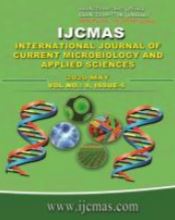


 National Academy of Agricultural Sciences (NAAS)
National Academy of Agricultural Sciences (NAAS)

|
PRINT ISSN : 2319-7692
Online ISSN : 2319-7706 Issues : 12 per year Publisher : Excellent Publishers Email : editorijcmas@gmail.com / submit@ijcmas.com Editor-in-chief: Dr.M.Prakash Index Copernicus ICV 2018: 95.39 NAAS RATING 2020: 5.38 |
Management of two critical and important resources viz., Land and water in agriculture has become a challenging task for many reasons. In rainfed and irrigated agriculture, land development plays a key role because of undulating topography of the soil surface. It has a major impact on the germination, water saving and crop yield. Conventional methods of land levelling are more cumbersome and not so precise and repetitive in nature and mainly depend on the skills of the driver. A significant (20-25 %) amount of irrigation water is lost during its application at the farm due to poor farm design and unevenness of the field. Unscientific and excessive irrigation is leading to degraded soil health because of water logging and salinity in almost all command areas of Karnataka. Scientific land levelling which can give a required slope depending on the soil type, saves irrigation water and facilitates field operation, conserves vital resources and increases the yield. The recent technology of laser land levelling can address these important issues and help to accomplish yield increase and agricultural sustainability in Karnataka. The studies on engineering approach of laser land levelling technology taken up for the first time in Karnataka during 2008-09 in the jurisdiction of the University of Agricultural Sciences, Raichur highlighted considerable reduction in drudgery of land levelling, higher levelling index, higher uniformity in soil-moisture distribution. It was observed that 25 to 35 % increase in paddy yield and water saving (25-30%), 30-40 % labour saving and 30 to 40 % saving in energy requirement in paddy cultivation.
 |
 |
 |
 |
 |